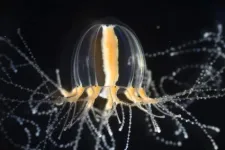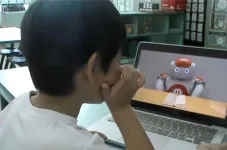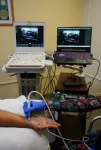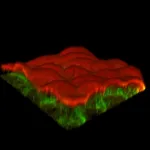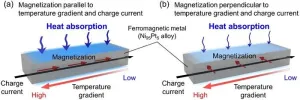(Press-News.org) Antibiotic-resistant bacteria have become a rapidly growing threat to public health. Each year, they account for more than 2.8 million infections, according to the U.S. Centers for Disease Control and Prevention. Without new antibiotics, even common injuries and infections harbor the potential to become lethal.
Scientists are now one step closer to eliminating that threat, thanks to a Texas A&M University-led collaboration that has developed a new family of polymers capable of killing bacteria without inducing antibiotic resistance by disrupting the membrane of these microorganisms.
“The new polymers we synthesized could help fight antibiotic resistance in the future by providing antibacterial molecules that operate through a mechanism against which bacteria do not seem to develop resistance,” said Dr. Quentin Michaudel, an assistant professor in the Department of Chemistry and lead investigator in the research, published Dec. 11 in the Proceedings of the National Academy of Sciences (PNAS).
Working at the interface of organic chemistry and polymer science, the Michaudel Laboratory was able to synthesize the new polymer by carefully designing a positively charged molecule that can be stitched many times to form a large molecule made of the same repeating charged motif using a carefully selected catalyst called AquaMet. According to Michaudel, that catalyst proves key, given that it has to tolerate a high concentration of charges and also be water-soluble — a feature he describes as uncommon for this type of process.
After achieving success, the Michaudel Lab put its polymers to the test against two main types of antibiotic-resistant bacteria — E. coli and Staphylococcus aureus (MRSA) — in collaboration with Dr. Jessica Schiffman’s group at the University of Massachusetts Amherst. While awaiting those results, the researchers also tested their polymers’ toxicity against human red blood cells.
“A common issue with antibacterial polymers is a lack of selectivity between bacteria and human cells when targeting the cellular membrane,” Michaudel explained. “The key is to strike a right balance between effectively inhibiting bacteria growth and killing several types of cells indiscriminately.”
Michaudel credits the multidisciplinary nature of scientific innovation and the generosity of dedicated researchers across the Texas A&M campus and country as factors in his team’s success in determining the perfect catalyst for their molecule assembly.
“This project was several years in the making and would not have been possible without the help of several groups, in addition to our UMass collaborators,” Michaudel said. “For instance, we had to ship some samples to the Letteri Lab at the University of Virginia to determine the length of our polymers, which required the use of an instrument that few labs in the country have. We are also tremendously grateful to [biochemistry Ph.D. candidate] Nathan Williams and Dr. Jean-Philippe Pellois here at Texas A&M, who provided their expertise in our assessment of toxicity against red blood cells.”
Michaudel says the team will now focus on improving the activity of its polymers against bacteria — specifically, their selectivity for bacterial cells versus human cells — before moving on to in vivo assays.
“We are in the process of synthesizing a variety of analogs with that exciting goal in mind,” he said.
The team’s paper, which features Michaudel Lab member and Texas A&M chemistry Ph.D. graduate Dr. Sarah Hancock ’23 as first author, can be viewed online along with related figures and captions. Other key contributors from the Michaudel Lab are chemistry graduate student An Tran ’23, postdoctoral scholar Dr. Arunava Maity and former postdoctoral scholar Dr. Nattawut Yuntawattana, who is now an assistant professor of materials science at Kasetsart University in Thailand.
This research was funded primarily by Michaudel’s National Institutes of Health Maximizing Investigators’ Research Award (MIRA) through the National Institute of General Medical Sciences.
A native of La Rochelle, France, Michaudel joined the Texas A&M Chemistry faculty in 2018 and holds a joint appointment in the Department of Materials Science and Engineering. In addition to an NIH MIRA in 2020, his career honors to date include a 2022 National Science Foundation Faculty Early Career Development (CAREER) Award, a 2022 American Chemical Society Polymeric Materials: Science and Engineering (PMSE) Young Investigator Award and a 2021 Thieme Chemistry Journals Award.
Learn more about Michaudel and his research at michaudellab.org.
END
Texas A&M team develops polymers that can kill bacteria
Dr. Quentin Michaudel and his research team have created a new family of polymers capable of killing bacteria without inducing antibiotic resistance — a major step in the fight against superbugs like E. coli and MRSA
2023-12-22
ELSE PRESS RELEASES FROM THIS DATE:
How jellyfish regenerate functional tentacles in days
2023-12-22
At about the size of a pinkie nail, the jellyfish species Cladonema can regenerate an amputated tentacle in two to three days — but how? Regenerating functional tissue across species, including salamanders and insects, relies on the ability to form a blastema, a clump of undifferentiated cells that can repair damage and grow into the missing appendage. Jellyfish, along with other cnidarians such as corals and sea anemones, exhibit high regeneration abilities, but how they form the critical blastema has remained a mystery until now.
A research team based in Japan has revealed that stem-like proliferative cells — which are actively growing and dividing but ...
Reindeer sleep while chewing their cud
2023-12-22
Researchers report December 22 in the journal Current Biology that the more time reindeer spend ruminating, the less time they spend in non-rapid eye movement (non-REM) sleep. EEG recordings revealed that reindeer’s brainwaves during rumination resemble the brain waves present during non-REM sleep, and these brainwave patterns suggest that the reindeer are more “rested” after ruminating. The researchers speculate that this multitasking might help reindeer get enough sleep during the summer months, when food is abundant ...
Trends in abdominoplasty: More outpatient surgery and concomitant liposuction
2023-12-22
Waltham — December 22, 2023 —
Abdominoplasty continues to be a safe and effective procedure, with more cases performed on an outpatient basis and increased use of concomitant liposuction, according to a new 16-year analysis in the January issue of Plastic and Reconstructive Surgery®, the official medical journal of the American Society of Plastic Surgeons (ASPS). The journal is published in the Lippincott portfolio by Wolters Kluwer.
"Taking advantage of quality-improvement data submitted by US Board-certified plastic surgeons, our study provides new insight ...
Like kids in a candy store
2023-12-22
Kyoto, Japan – A non-prescription drug abuse crisis in Japan seems only one overdose away. The demand for a particular anti-cough drug has been rising, along with the social impact of its abuse due to its psychosomatic effects.
The ease of obtaining information online about how to acquire over-the-counter medications or OTCs for achieving overdose, however, does not appear to be the real problem.
Now, a study by a team of researchers at Kyoto University suggests that reliable information about OTC abuse needs to be readily available and effectively disseminated.
"We ...
Robots versus humans: Which would children trust more when learning new information?
2023-12-22
In this digital age, children are exposed to overwhelming amounts of information online, some of it unverified and increasingly generated by non-human sources, such as AI-driven language models. As children grow older, the ability to assess a source’s reliability is an important skill in cultivating critical thinking.
Children aged three to five years display selective trust based on the informant’s past accuracy when faced with both humans and robots, according to a study published in the journal Child Development titled, ‘Younger, not older, ...
AI tool aids in screening for nerve disorder
2023-12-22
Researchers at the Indian Institute of Science (IISc), in collaboration with Aster-CMI Hospital, have developed an AI tool that can identify the median nerve in ultrasound videos and detect carpal tunnel syndrome (CTS). The study was published in IEEE Transactions on Ultrasonics, Ferroelectrics, and Frequency Control.
CTS arises when the median nerve, which runs from the forearm into the hand, is compressed at the carpal tunnel part of the wrist, resulting in numbness, tingling or pain. It ...
Big impacts from small changes in cell
2023-12-22
Tiny things matter – for instance, one amino acid can completely alter the architecture of the cell. Researchers at the Universities of Göttingen and Warwick investigated the structure and mechanics of the main component of the cytoskeleton of the cell: a protein known as actin. Actin is found in all living cells where it has a range of important functions – from muscle contraction to cell signalling and cell shape. This protein comes in two different varieties termed “isoforms”, which are known as gamma actin and beta actin. The difference between the two proteins is ...
Jupiter was targeted by exoplanet hunter
2023-12-22
For the first time, an instrument to find planets light years away was used on an object in the Solar System, in a study on Jupiter's winds.
We find ourselves at a time when it has become almost commonplace to discover planets orbiting another star, with more than 5,000 already registered. The first distant worlds to incorporate this list were mainly giant planets, similar to but also very different in many ways from Jupiter and Saturn.
Astrophysicists have already begun to obtain data on the atmospheres of exoplanets, but fundamental ...
Pandemic lessons: Insights into how mobility restrictions affect healthcare costs
2023-12-22
Osaka, Japan - As the world grappled with lockdowns and restrictions brought by the COVID-19 pandemic, researchers at Osaka Metropolitan University conducted an extensive study to elucidate the link between changes in human mobility and the impact on medical costs associated with lifestyle-related diseases.
Dr. Haruka Kato and Professor Atsushi Takizawa of the Graduate School of Human Life and Ecology at Osaka Metropolitan University were concerned by the negative health effects resulting from the restriction of ...
Controlling thermoelectric conversion in magnetic materials by magnetization direction
2023-12-22
1. NIMS has succeeded in directly observing the "anisotropic magneto-Thomson effect," a phenomenon in which the heat absorption/release proportional to an applied temperature difference and charge current (i.e., Thomson effect) changes anisotropically depending on the magnetization direction in magnetic materials. This research is expected to lead to further development of basic physics and materials science related to the fusion area of thermoelectrics and spintronics, as well as to development of new functionalities to control thermal energy with magnetism.
2. The Thomson effect has long been known as one of the fundamental ...
LAST 30 PRESS RELEASES:
Transient Pauli blocking for broadband ultrafast optical switching
Political polarization can spur CO2 emissions, stymie climate action
Researchers develop new strategy for improving inverted perovskite solar cells
Yes! The role of YAP and CTGF as potential therapeutic targets for preventing severe liver disease
Pancreatic cancer may begin hiding from the immune system earlier than we thought
Robotic wing inspired by nature delivers leap in underwater stability
A clinical reveals that aniridia causes a progressive loss of corneal sensitivity
Fossil amber reveals the secret lives of Cretaceous ants
Predicting extreme rainfall through novel spatial modeling
The Lancet: First-ever in-utero stem cell therapy for fetal spina bifida repair is safe, study finds
Nanoplastics can interact with Salmonella to affect food safety, study shows
Eric Moore, M.D., elected to Mayo Clinic Board of Trustees
NYU named “research powerhouse” in new analysis
New polymer materials may offer breakthrough solution for hard-to-remove PFAS in water
Biochar can either curb or boost greenhouse gas emissions depending on soil conditions, new study finds
Nanobiochar emerges as a next generation solution for cleaner water, healthier soils, and resilient ecosystems
Study finds more parents saying ‘No’ to vitamin K, putting babies’ brains at risk
Scientists develop new gut health measure that tracks disease
Rice gene discovery could cut fertiliser use while protecting yields
Jumping ‘DNA parasites’ linked to early stages of tumour formation
Ultra-sensitive CAR T cells provide potential strategy to treat solid tumors
Early Neanderthal-Human interbreeding was strongly sex biased
North American bird declines are widespread and accelerating in agricultural hotspots
Researchers recommend strategies for improved genetic privacy legislation
How birds achieve sweet success
More sensitive cell therapy may be a HIT against solid cancers
Scientists map how aging reshapes cells across the entire mammalian body
Hotspots of accelerated bird decline linked to agricultural activity
How ancient attraction shaped the human genome
NJIT faculty named Senior Members of the National Academy of Inventors
[Press-News.org] Texas A&M team develops polymers that can kill bacteriaDr. Quentin Michaudel and his research team have created a new family of polymers capable of killing bacteria without inducing antibiotic resistance — a major step in the fight against superbugs like E. coli and MRSA
